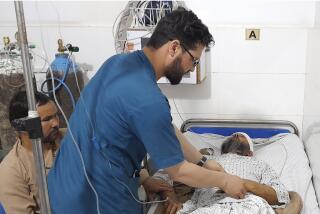7 suspects held in Afghanistan attacks
- Share via
KABUL, AFGHANISTAN, AND ISLAMABAD, PAKISTAN — Afghan authorities said Wednesday that they had arrested seven men and killed an eighth who were suspected of having helped carry out a brazen attack last month on the Justice Ministry and other government buildings in the capital.
The coordinated Feb. 11 raids by gunmen and suicide bombers, which killed 21 people and injured more than 50, illustrated the apparent ease with which insurgents were able to penetrate even the most heavily guarded corners of Kabul. Eight attackers died as well.
The arrests were disclosed by Sayed Ansari, a spokesman for Afghanistan’s intelligence agency, the National Directorate for Security. Ansari repeated allegations made last month by Afghan officials that the attack had involved the intelligence service of “a neighboring country,” widely interpreted to mean Pakistan.
The government in Kabul has repeatedly accused Pakistan’s powerful Inter-Services Intelligence agency of helping insurgents carry out attacks on Afghan soil. Pakistan has consistently denied the allegations.
Ansari said the seven suspects were arrested in Kabul and adjoining Lowgar province, which has emerged this year as a major center of unrest on the capital’s doorstep. Several thousand U.S. troops from the Army’s 10th Mountain Division have been attempting to restore order there.
The eighth suspect was killed in Lowgar, Ansari said at a news conference.
He added that the assailants were believed to have trained in Pakistan’s tribal areas and communicated with Pakistani-based handlers before and during the assaults.
Meanwhile, NATO’s secretary-general warned that existing troop commitments would not be sufficient to secure Afghanistan’s presidential election, which is set for August. Jaap de Hoop Scheffer told reporters in the capital that about 4,000 additional troops -- about four battalions -- would be needed to ensure that the vote takes place peacefully.
Germany has said it will provide about 600 more troops to help secure the balloting. North Atlantic Treaty Organization officials said a U.S. infusion of 17,000 troops planned for the coming months had already been factored in.
Western military leaders in Afghanistan have also been wrestling with the problem of assaults on the supply lines that run through Pakistani territory.
Months of attacks, most of them in northwestern Pakistan, have resulted in the loss of hundreds of containers and military vehicles.
On Wednesday, another part of the route, in Pakistan’s south, came under attack when motorcycle-borne assailants damaged a truck carrying heavy equipment. In the previous two days, attackers outside the northwestern city of Peshawar had targeted truck stops with rockets and torched trucks and Humvees.
NATO and U.S. commanders are in the process of arranging alternative routes through Central Asia, but those are not yet fully operational. About three-quarters of Western supplies for forces in Afghanistan are still trucked through Pakistan.
Underscoring growing Western concerns about insurgent violence on the Pakistani side of the border, the United Nations made a fresh appeal Wednesday for the release of John Solecki, an American who worked for the U.N. refugee agency in the southern Pakistani city of Quetta. He was abducted Feb. 2, purportedly by a group linked to rebels fighting for the independence of Baluchistan province, and his captors have threatened repeatedly to kill him. Pakistani news reports have said Solecki is suffering from health problems.
Insurgents, mainly Taliban-linked, have carried out a number of abductions in the last three months, mainly in or near the volatile tribal areas along the Afghan border. A Polish geologist was beheaded by his captors last month, and the fate of a kidnapped Canadian woman is unknown.
--
Faiez is a special correspondent.
More to Read
Sign up for Essential California
The most important California stories and recommendations in your inbox every morning.
You may occasionally receive promotional content from the Los Angeles Times.













